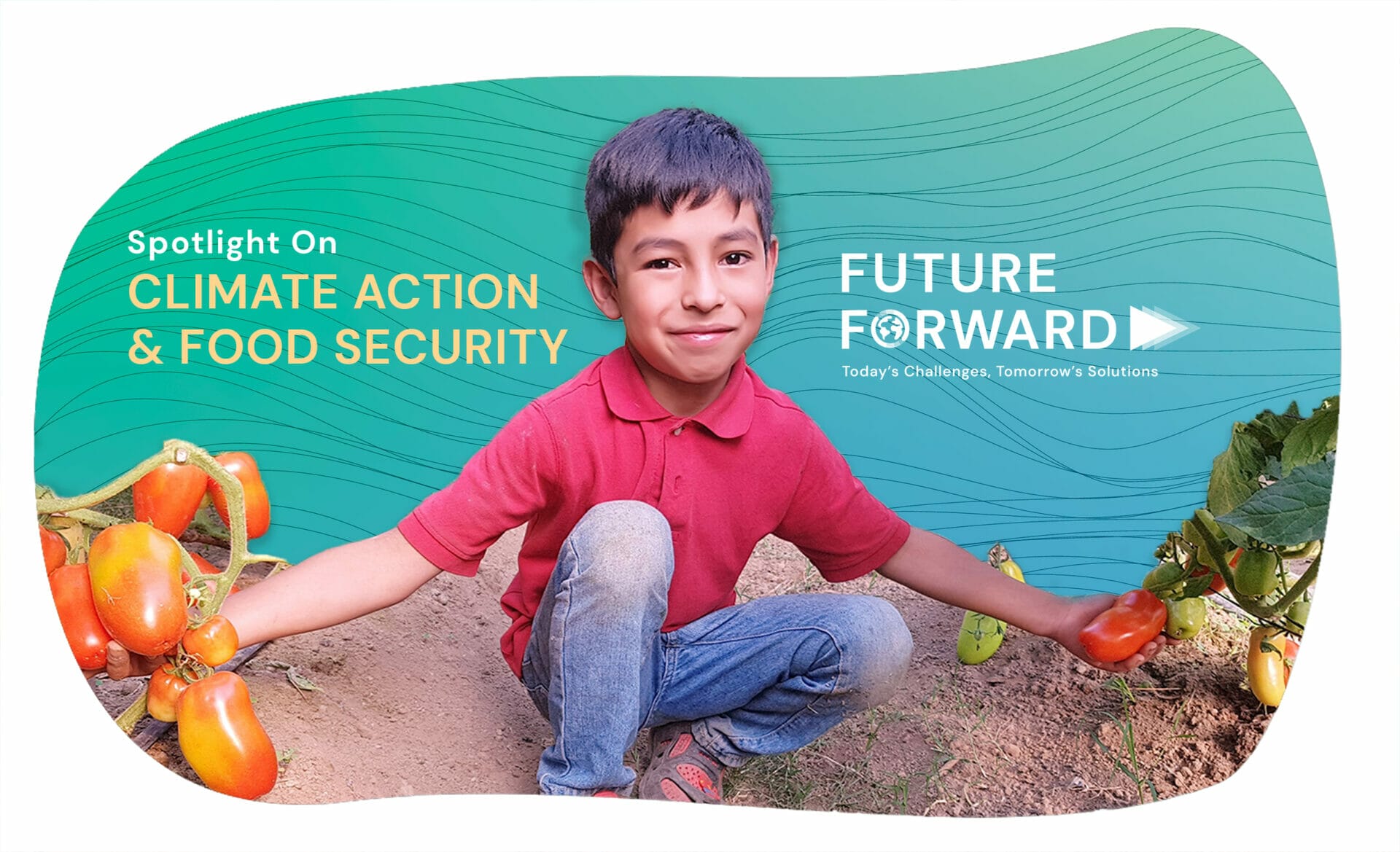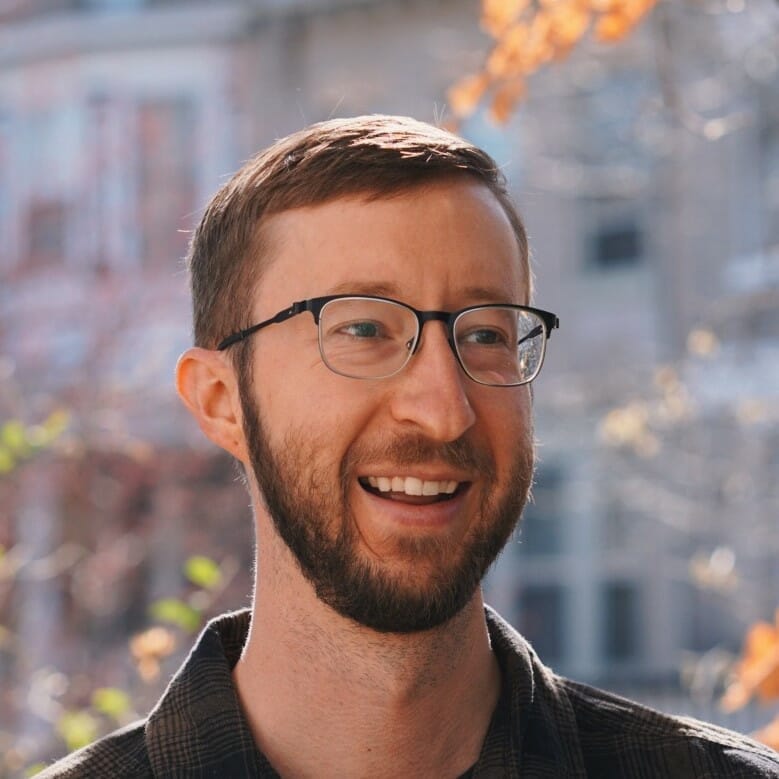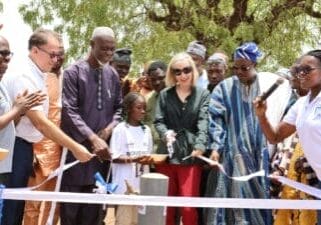News > Blog
Confronting Climate Change with Bold, Community-Based Actions
Published 04/22/2022 by Global Communities

By Tanner Roark
Climate change is here. It can be seen in every corner of the world, from heatwaves in India and winter storms in Texas to hurricanes in Guatemala and drought in Madagascar. Climate change is cruel. It spares no people or place, and its slow creep of destruction results in the loss of livelihoods and lives. Climate change is unjust. The people contributing the least to climate change are suffering the greatest impact, with existing inequities compounding.
The negative effects of climate change have pushed the development community’s goal of zero hunger further out of reach. About 800 million people faced hunger in 2020 with around 54 percent of undernourished people living in Asia and 37 percent living in Africa.1 Sadly, the number of people facing hunger worldwide has increased for the sixth year in a row with more than 118 million additional people facing hunger now compared to 2019, with climatic disasters responsible for 34 million of those additional hungry people.2
Despite the harrowing outlook, communities around the world are combating climate change and improving food security by tapping into Indigenous knowledge, adopting innovative technologies and partnering with Global Communities.
We use a future-forward approach to our climate action and food security work. This means our work with communities is proactive rather than reactive. Our goal is to help communities gain a head start and address potential challenges before they manifest. It is difficult to predict when a volcano might erupt, an earthquake might strike or a flash flood might develop, but by helping communities prepare for and mitigate climatic disasters, they stand a much better chance of withstanding these shocks and recovering quickly. We understand that climate change and food insecurity impact different populations in unique ways. That is why our Climate Action approach is community-based and sensitive to the needs of vulnerable populations, particularly women and children.
Advancing Gender Equity in Climate Action
Women bear the greatest burdens related to climate change. The instability resulting from climate change intensifies women’s vulnerabilities and subjects them to higher rates of poverty, food insecurity, displacement and violence.3 The solutions to climate change are inseparable from gender equity. In the Dry Corridor of Guatemala, Global Communities works with Indigenous women to combat climate change and improve food security through the Climate Smart Commitment program funded by Rick Steves’ Europe, the company of the popular author and travel guide Rick Steves.
In the last two years, 28,000 trees have been planted and more than 338 households have been provided with EcoWater filters and outfitted with fuel-efficient cookstoves. The cookstoves alone reduce household carbon emissions by more than 50 percent while simultaneously alleviating smoke-related health issues that are common among women. The work these Indigenous women are doing in partnership with Global Communities will offset more than 11,878 tons of Co2, the equivalent of 9,960 U.S./Europe round-trip flights over the next eight years.
Securing a healthier future for the next generation
Children are victims of climate change as well. Currently, 22 percent, or 149.2 million children under five globally, are stunted and 45.4 million or 6.7 percent of children experience wasting.4 By 2050, the risk of hunger and malnutrition could rise by 20 percent if climate change is not curbed.5
Global Communities works in partnership with the U.S. Department of Agriculture through McGovern-Dole International Food for Education and Child Nutrition (MGD) projects in climate-impacted geographies such as Guatemala, Madagascar and Tanzania. Through these integrated school feeding projects, more than 300,000 students are guaranteed a hot nutritious meal and learn the principles of climate resilient food production through hands-on learning in school gardens. These gardens also act as learning hubs for parents and the broader community to learn conservation agriculture techniques that can be applied to their farms. Climate adaptive efforts such as these increase food security at home and play a role in keeping children in school.
School gardens are complemented with our signature “Green Meals” approach, combining high-efficiency school kitchen cook stoves with school nursery tree seedling production and climate change curricula. These community-centered and community-led interventions are actively building the next generation’s knowledge in developing tomorrow’s climate challenge solutions.
Revolutionizing how african pastoralists graze their herds
Pastoralists, who must move their herds in search of fresh pasture and water, have had their lives and livelihoods disrupted by climate change. Weather unpredictability is disrupting pasture regrowth and recharging of watering holes, thereby complicating traditional scouting practices for pastures, increasing the need for expensive supplemental feed and, in some situations, resulting in the death of livestock. When livelihood costs increase and income is lost, food insecurity follows.
With funding from the U.S. Agency for International Development (USAID), Global Communities is implementing the Resilience in Pastoral Areas (RIPA) program in southern Ethiopia. Communities are being trained in Holistic Management and using AfriScout, a mobile application developed by Global Communities to connect pastoralists with current information on water and vegetation conditions through localized community grazing maps on basic smartphones. AfriScout brings together the traditional knowledge of pastoralists and innovative technologies to respond to climate change-related challenges, while improving livelihoods and food security.
These are just a few examples of the Climate Action work that Global Communities undertakes. We work intentionally to integrate climate change considerations into our programs around the world. This is core to our future-forward approach. Each year, internationally recognized climate change conferences garner the spotlight with multi-lateral commitments and decades-long strategic plans. These policy endeavors are important because they remind us that addressing climate change will take political will and large-scale buy-in. However, each day, with much less appreciation or fanfare, pastoralists in the Great Rift Valley, children in primary school gardens and Indigenous women in rural highlands are doing their part to combat climate change, improve food security and build a better future. Global Communities will continue to be there to support them.

Tanner Roark is an Associate Technical Advisor in Food Security & Commodity Support and has been with Global Communities since 2017. His expertise has led him to support food security and climate change programs in Ethiopia, Guatemala, Malawi, Tanzania, Uganda and the United States. Tanner is also involved in local agriculture initiatives, where he acts as volunteer Garden Manager at a community garden in Washington, D.C.
This content is part of Future Forward, a thought leadership and storytelling series on how Global Communities is driving change to save lives, advance equity and secure strong futures. To learn more, visit globalcommunities.org/futureforward.
[1] FAO, IFAD, UNICEF, WFP and WHO. 2021. The State of Food Security and Nutrition in the World 2021. Transforming food systems for food security, improved nutrition and affordable healthy diets for all. Rome, FAO.
[2] Food Security Information Network, 2020 Global Report on Food Crises.
[3] UNDP, Global Gender and Climate Alliance – Gender and Climate Change: Overview of linkages between gender and climate change. 2016.
[4] UNICEF/WHO/World Bank Group – Joint Child Malnutrition Estimates 2021 Edition.
[5] World Food Programme. Climate Crisis and Malnutrition: A case for acting now. September 2021.





